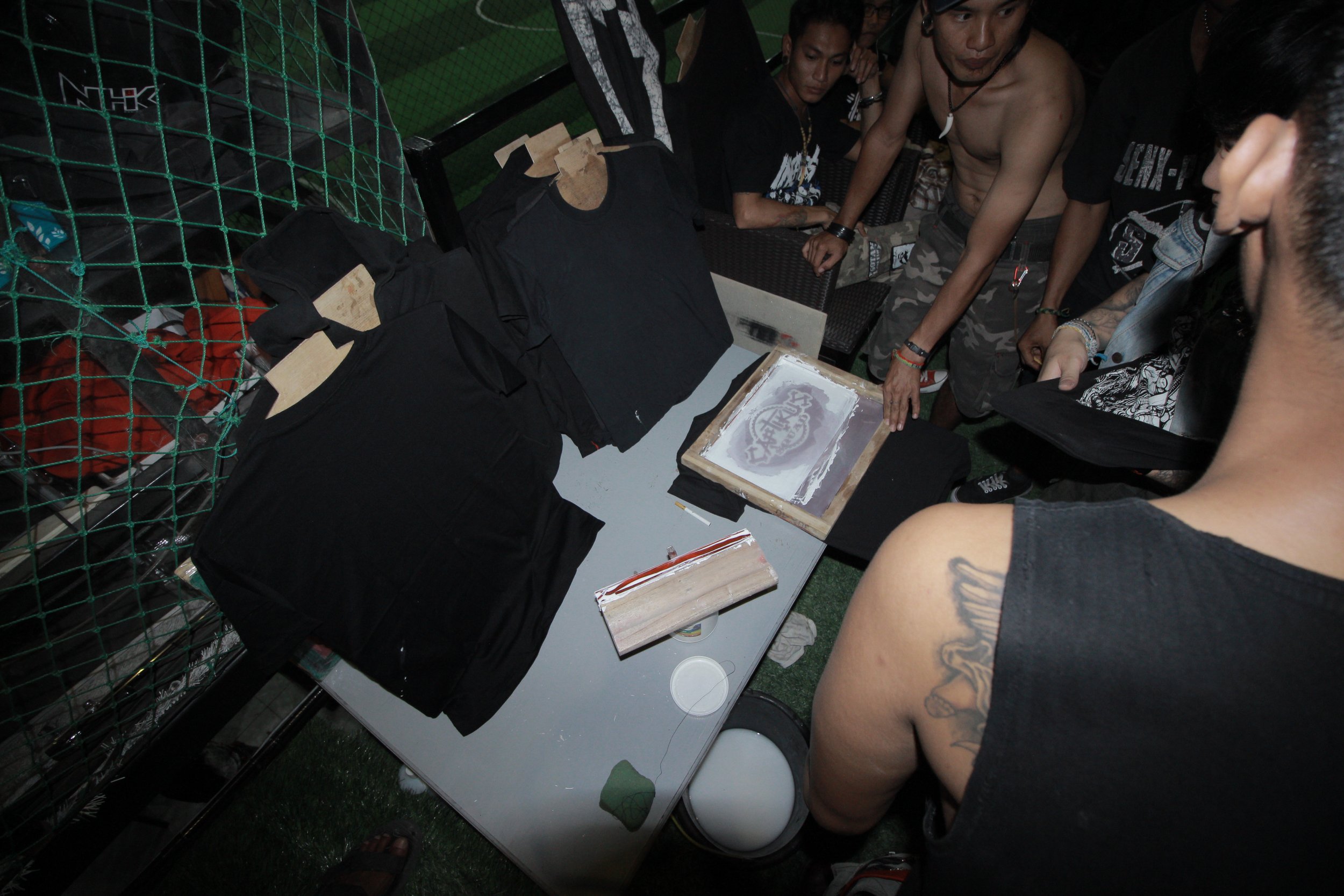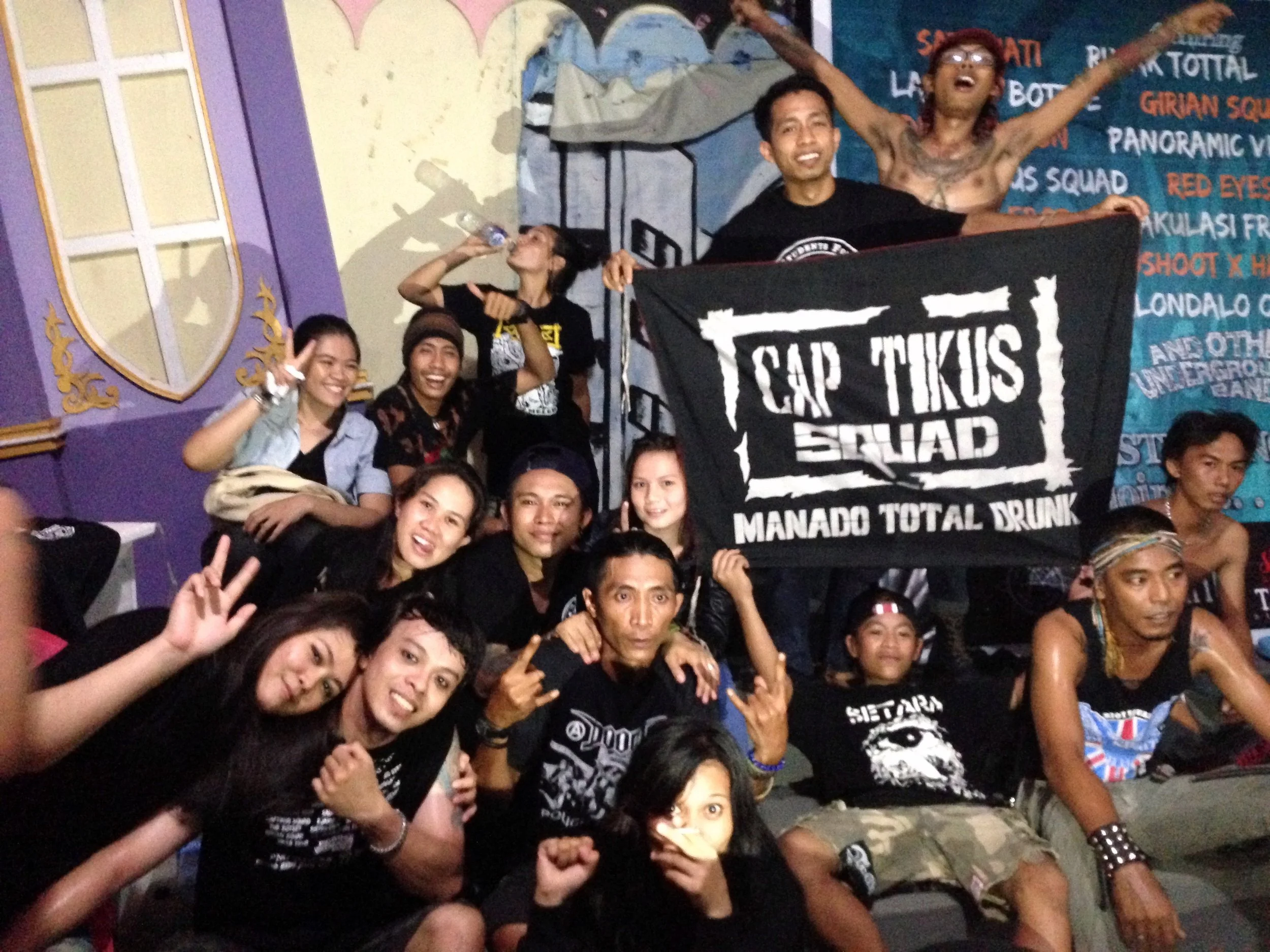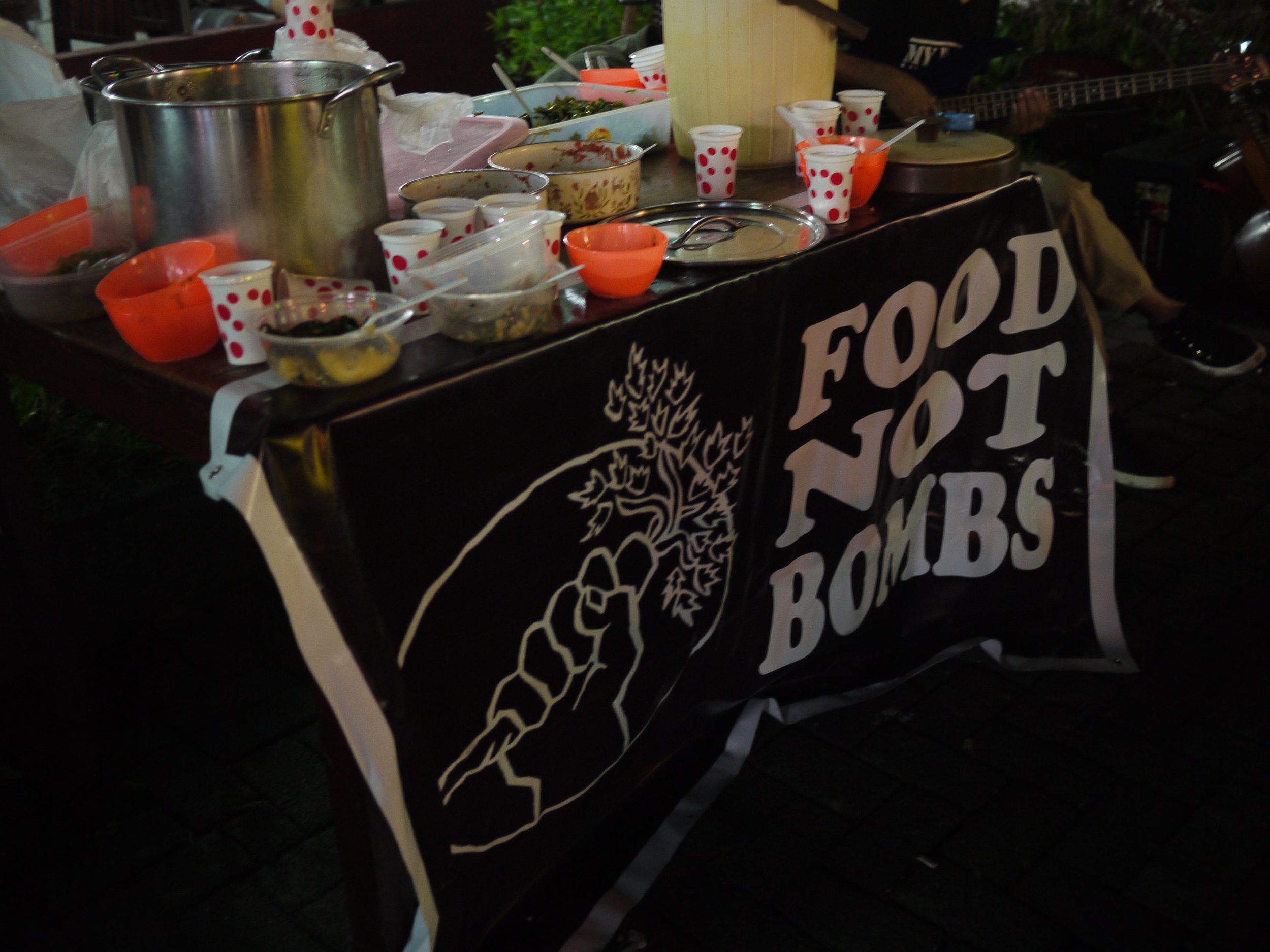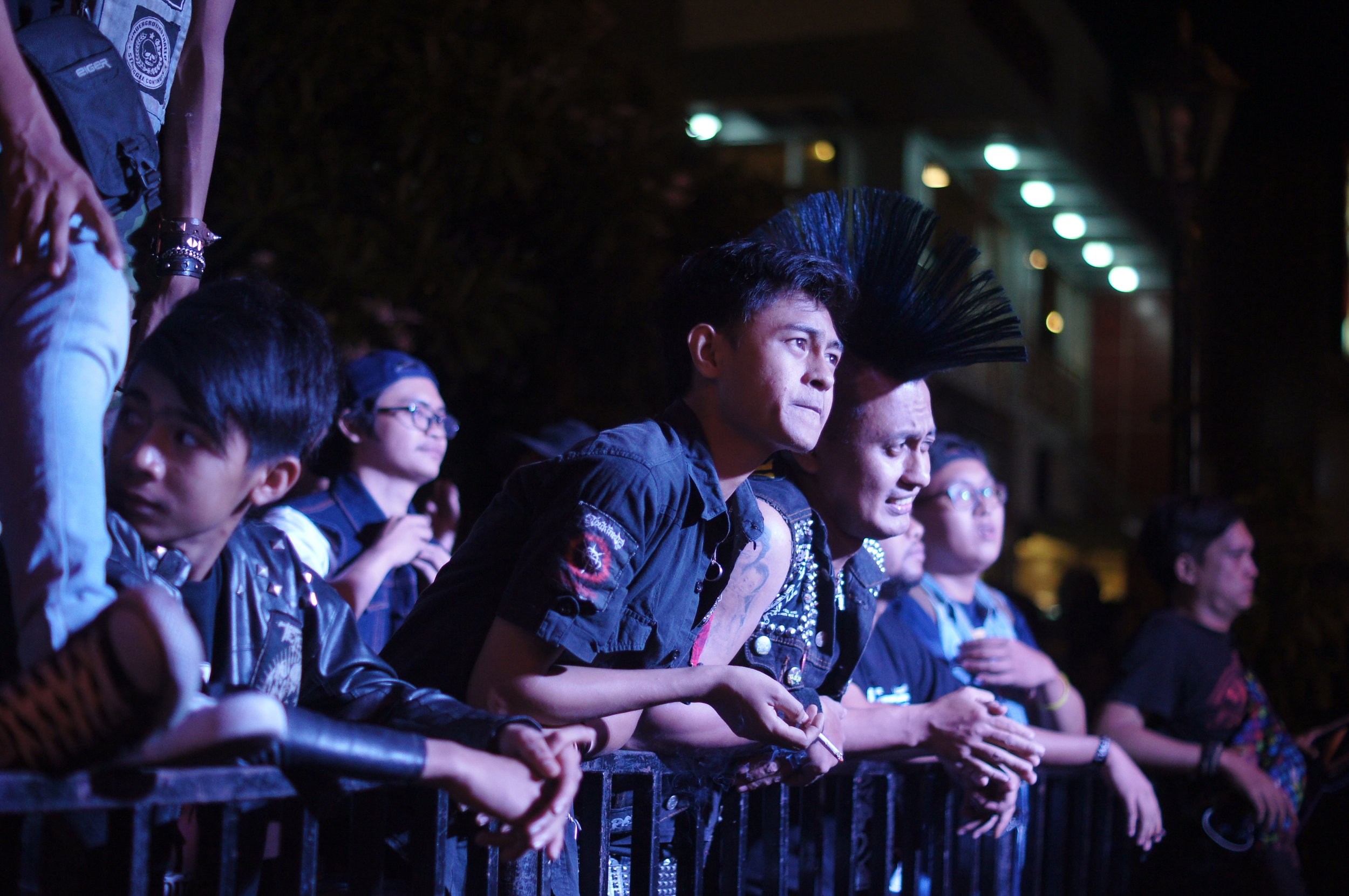Chapter 3 | Musical Contestations
Local punk band CapTikus Squad’s latest song, “Cap Tikus Is Not a Criminal” (Cap Tikus Bukan Kriminal ), loudly proclaimed the band’s strong support for Cap Tikus as an important local drink and cultural asset. The song juxtaposed the drink’s cultural, social, and heritage value with the largely negative news coverage and rhetoric otherwise surrounding it. “When you say Cap Tikus, it is immediately identified as something negative,” said Metox, the lead singer. “The reality is that there is a lot of misunderstanding, and people take Cap Tikus to be something criminal.”
Chapter 3, Musical Contestation, explores the intimate relationship between the drink and the values of local punks, as well as how these values were not separate from but closely connected to more broadly shared values in North Sulawesi and Minahasa traditions. It further reveals how Cap Tikus was actively involved in keeping youth sociality and spirit alive while also coming into tension with other important social, intergenerational, and “adult” expectations.
Cap Tikus Bukan Kriminal | Cap Tikus is Not Criminal
“Aset budaya,
Harta paling berharga,
Kini dianggap nista,
Ooo, Ooo, CapTikus bukan kriminal...
Aset budaya,
Harta paling berharga,
Harus dijaga,
Ooo, Ooo, CapTikus bukan kriminal...
Moral bejat,
Aksi la kuat,
Napsu sahat,
Ooo, Ooo, CapTikus bukan kriminal...
Pengecut, para pengecut,
Beralibi Karena Cap Tikus,
Ooo, Ooo, CapTikus bukan Kriminal...”
“A cultural asset,
The most precious of treasures,
Now being insulted,
Cap Tikus is not criminal.
A cultural asset,
The most precious of treasures,
Must be protected,
Cap Tikus is not criminal.
Morally depraved,
Strong action,
Lust,
Cap Tikus is not criminal.
Cowards, you cowards,
Cap Tikus gives you an alibi,
Cap Tikus is not criminal."
Credit: Fieldy Rondo
This chapter looks at the local underground punk band CapTikus Squad and their base of fans and friends as they contest the growing problematization of Cap Tikus in North Sulawesi. Punk identity and lifestyle are often articulated as a struggle, a fight, or a countercultural force (Russ Bestley et al. 2021). Here, we see CapTikus Squad reappropriating the drink as their struggle, using the tradition of communal drinking to express and construct local punk values. While punk scenes around the world are stereotyped as confrontational and resistant to traditional values (Achtermann 2021), in Manado, punks turned to tradition as part of their resistance against both mainstream values and the ever-growing desire for a new and more modern Manado.
It was May 1, 2015, and the Manado punk community (komunitas punk) had organized a small show to celebrate May Day, also known as International Workers’ Day. It was an important day for many Indonesian punks (anak punk), who were strongly influenced by class-oriented political action, including the anarchist anti-authoritarian resistance that had challenged Suharto’s New Order regime in the 1990s as well as worker’s strikes on past May Days (Russ Bestley et al. 2021; S. R. Martin-Iverson 2011; Moog 2020b; Wallach 2008a; Donaghey 2016).
Like the punks that night, the Cap Tikus circulating the venue had come from all over North Sulawesi. People had brought their own local varieties, eager for others to have a taste.
Underground events like these gave the local punk community an opportunity to come together, sport their famous mohawks, and share their latest slogans and designs on T-shirts that they themselves had screen-printed (Martin-Iverson 2012). Some wore leather boots and leather jackets, while others displayed their ever-growing number of tattoos. Almost everybody, though, was dressed in black. Even though there was a surprisingly large number of girls present, men, as usual, were by far the majority.
The tongkrongan was an important place for punks. It provided them with a space to come together, share their experiences, pass on ideas, and exchange skills and services—all part of their commitment to a DIY (do-it-yourself) ethos (Martin-Iverson 2016). While previously the tongkrongan had been, at various times, an alleyway, the street in front of abandoned buildings, or a construction site, it was now a large wooden house in the center of town.
Shared communal drinking served as a site of resistance against such values of modernization and crafted a collective identity for CapTikus Squad and their friends, who cultivated a strong sense of togetherness in their shows and drinking circles.
For some of the punks, using “stuff” (synthetic drugs such as strong painkillers, tranquilizers, and opiates) may have been a way to signal resistance and disregard for society’s dominant ideals and, thus, constructing a positive punk identity. However, this was hugely disappointing to other Manado punks, who saw it as detracting from practices core to punk sociality and their sense of community.
“Where there is Cap Tikus, there is venting,” said Anky, a Manado punk. Like many others, he referred to Cap Tikus as air kata-kata, a term that literally translates as “words water” but which was popularly used to capture what many of the youth described as the drink’s ability to function as a stimulant (perangsang) for livening up conversations, triggering creative inspiration, increasing self-confidence (lebe pede), and becoming more daring (tambah berani).
They were the closing band, and while their lyrics aimed to dissolve the links between Cap Tikus and violence and crime, the crowd in front of them had suddenly begun to dance more violently than before. The heavy breathing of the young men in the small mosh pit, I imagine, might have been as fast and sharp as the tempo of the loud music, their bodies heating up like the small generator powering the whole event until, suddenly, everything overheated. There were pushes and punches thrown and the crowd split.
“Many groups of people take Cap Tikus to be something negative,” said Ipank, the guitarist. “It becomes a scapegoat for every person who fights or hits someone.” That was why they played the songs they did, he explained. “We make our voice and message heard, that Cap Tikus is neutral, and it depends on the person.”
While CapTikus Squad and other local punk youth clearly identified violence and criminality as a problem, the way in which they understood and approached the problem differed from the police and local authorities. The police saw drunkenness as a direct cause of criminal behavior and therefore targeted alcohol and its consumption. CapTikus Squad, on the other hand, defended alcohol, Cap Tikus specifically. Their argument was based on their own lived experience of its effects and their understanding that it was not the substance itself that led to violence, making collective regulation and the enabling of a positive drinking experience the responsibility of the wider group.
“One bottle is about being together,” said Ditto, the bass player. Below the slogan, in smaller print, was the band’s other famous slogan, “For Making Friends, Not Starting Fights” (For Batamang Bukang For Bakalae). It used local Manadonese to respond to the way many people reacted to Cap Tikus.”
The punks adopted and expressed values that were similar to these Manadonese and Minahasan values of unity, solidarity, and equality, particularly in their regular gatherings to support one another’s activities or social and environmental movements.
As a cheaper and stronger option than other alcoholic drinks, Cap Tikus was accessible to most people and suitable for sharing in large and small groups; this made it the punk’s drink of choice, as it aligned with their ideals of unity (persatuan), solidarity (solidaritas), and equality (persamaan). There also was a sociality behind purchasing Cap Tikus that reflected these ideals, though again, it wasn’t exclusive to the punks: baku tambah doi (literally translated, “reciprocally adding money”) meant participants in drinking circles sharing the cost of the drinks, with each person putting in whatever they could afford. This meant that all were welcome regardless of their financial standing.
Unfortunately for the band, their name and association with alcohol meant that there were occasions when they were shunned by larger, more commercial music events or venues, as their presence could suggest that these events and venues were against the local and nationwide efforts to tighten regulations on the distribution and consumption of alcohol. This was disappointing for the band.
Despite the name, CapTikus Squad was the opening act when Sabotage, a famous Indonesian punk band, came to Manado in August 2015. It was the first time I had ever seen CapTikus Squad perform at a large open-air event, much less one sponsored by one of Indonesia’s largest cigarette companies. The event, Manado Bergerak, took place on one of Manado’s main commercial strips and, ironically, directly next to a McDonald’s—a symbol of the global capitalism and excessive consumerism that the punks normally protested.
While Cap Tikus indeed enabled people to be released from their responsibilities and worries, this did not include all responsibilities. For many of the punks in Manado, if someone misbehaved, they should be called out and reminded by their friends that everyone was there to have fun. This form of shared responsibility and collective care was mobilized to maintain order, and it was especially important for the punks as it was a DIY form of social protection that came from within their community rather than from police intervention, top-down social hierarchy, or a regulatory approach.
The text on this page is extracted from the PhD thesis: “Inside the Drinking Circle: Cap Tikus, Contested Modernities, and Youth Resistance in Manado, North Sulawesi.” This thesis was submitted by Nastasja Ilonka Roels as part of the Doctoral Regulations of the University of Amsterdam (UvA). All text references should be made to the original thesis manuscript, once published via the UvA Digital Academic Repository, and not to this website. Permission is required to copy, display or reuse images, songs, and videos.


























